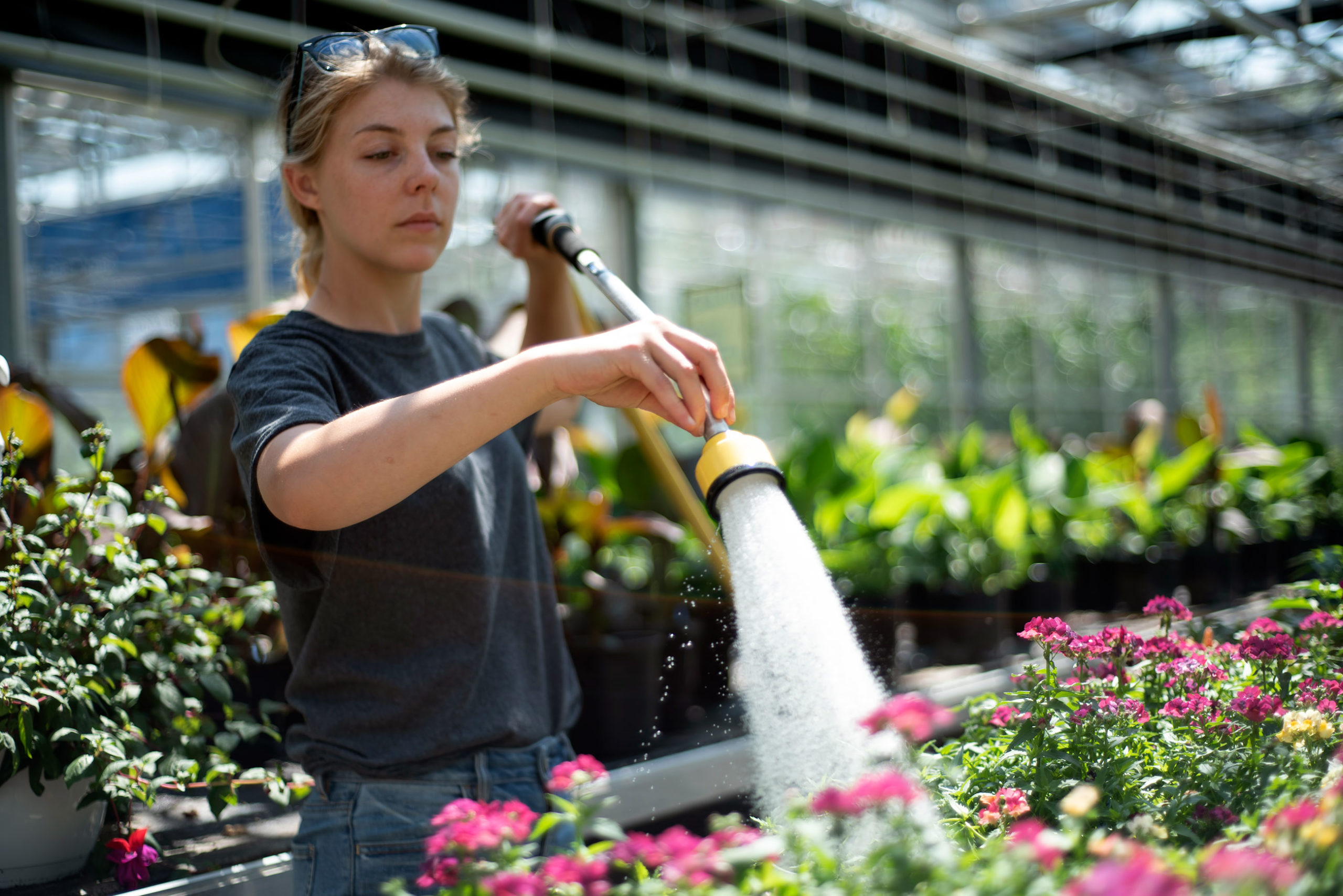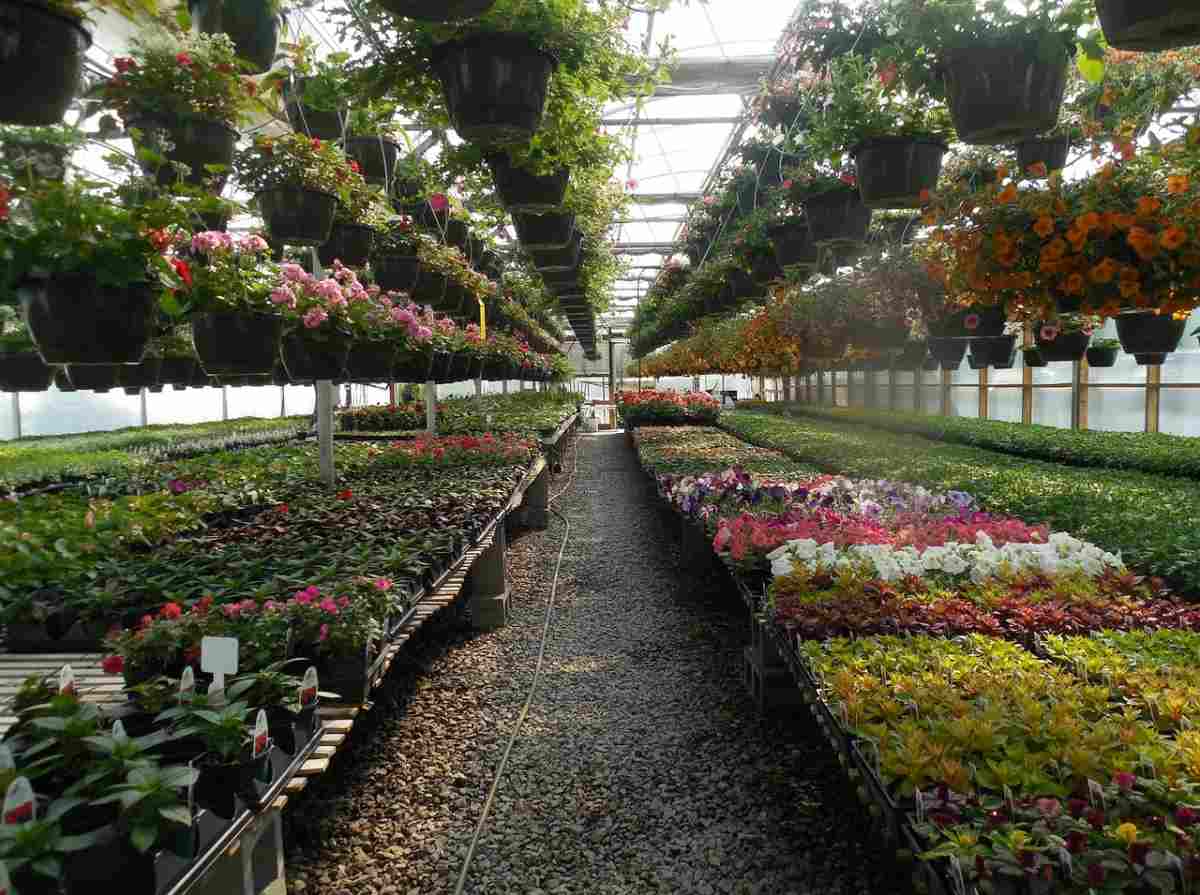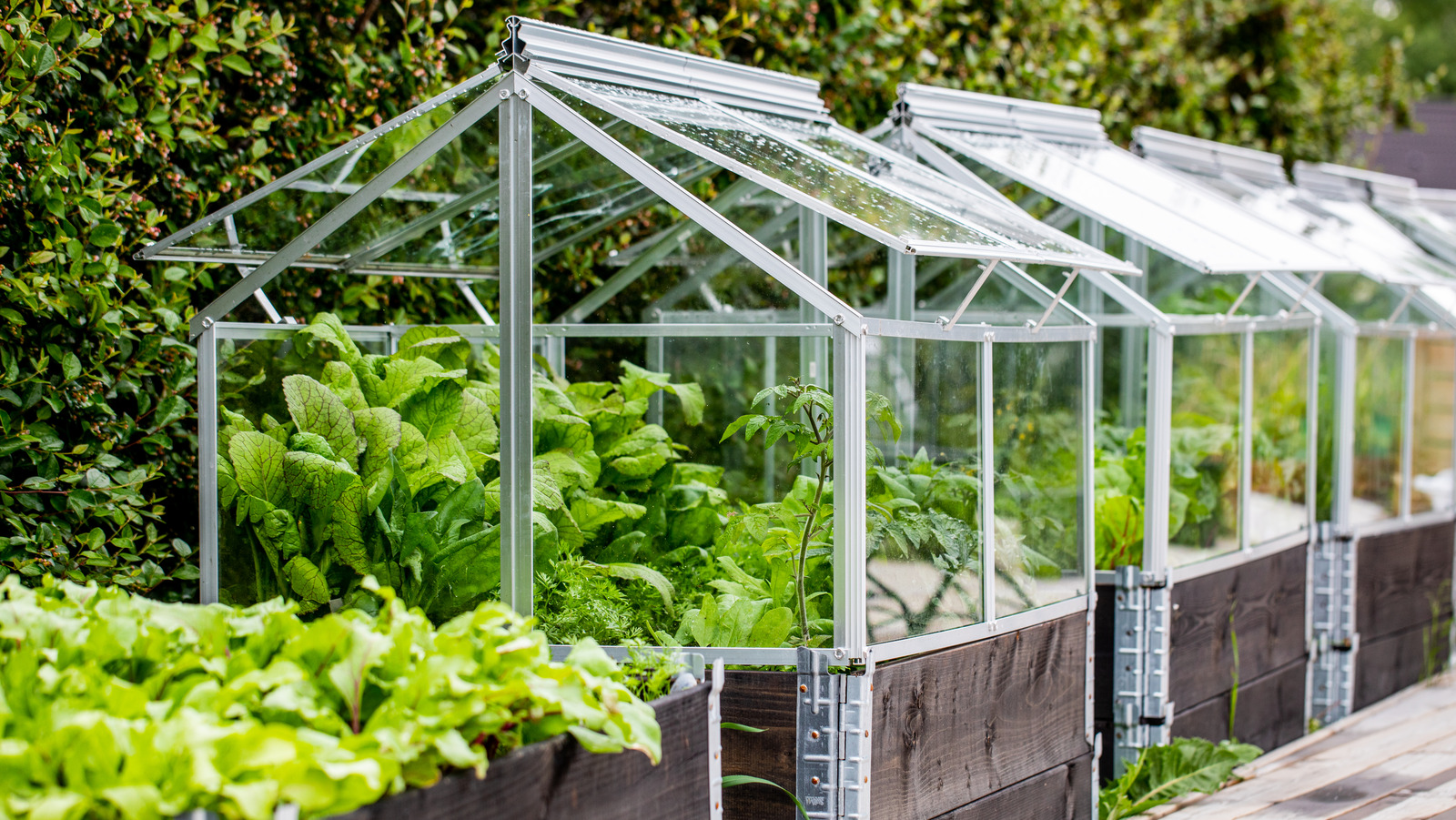Home>Gardening Basics>What Is A Greenhouse Technician


Gardening Basics
What Is A Greenhouse Technician
Modified: January 22, 2024
Discover the essential steps to becoming a greenhouse technician. Learn about the training, skills, and job opportunities in the industry with our comprehensive guide.
(Many of the links in this article redirect to a specific reviewed product. Your purchase of these products through affiliate links helps to generate commission for Chicagolandgardening.com, at no extra cost. Learn more)
Table of Contents
Introduction
Welcome to the world of greenhouse technology! In this article, we will explore the fascinating role of a greenhouse technician. If you have ever wondered about the magic behind growing plants in controlled environments, this is the job for you. As a greenhouse technician, you will play a vital role in ensuring the optimal growth and health of plants within a greenhouse.
A greenhouse is a specialized structure that provides an ideal environment for plants to thrive. With carefully controlled temperature, humidity, light, and ventilation, greenhouse technicians create the perfect conditions for plant cultivation. They work with a wide variety of plants, from flowers and herbs to vegetables and even tropical plants.
Greenhouse technicians are responsible for a multitude of tasks, including monitoring and adjusting environmental conditions, planting and maintaining crops, and troubleshooting any issues that may arise. Their expertise and attention to detail are essential in promoting healthy growth and preventing disease or pest infestations.
While the role of a greenhouse technician may sound challenging, it is also incredibly rewarding. Watching a tiny seedling grow into a flourishing plant under your care can be a deeply satisfying experience. Greenhouse technicians are at the forefront of ensuring sustainable food production, contributing to a greener future.
Whether you are a seasoned horticultural enthusiast or someone looking to embark on a new career path, the role of a greenhouse technician offers a unique blend of science, creativity, and hands-on work. So, let’s dive deeper into the responsibilities, skills, qualifications, training, and job outlook for greenhouse technicians!
Job Description
The job of a greenhouse technician is diverse and dynamic, requiring a combination of technical knowledge, physical labor, and problem-solving skills. The primary goal is to create an ideal growth environment for plants within the greenhouse.
One of the key responsibilities of a greenhouse technician is to monitor and adjust environmental conditions. This includes regulating temperature, humidity, and light levels to mimic the natural conditions needed for optimal plant growth. They may use specialized equipment such as thermostats, misters, and grow lights to maintain the desired conditions.
Planting and maintaining crops is another crucial aspect of the job. Greenhouse technicians are responsible for planting seeds, transplanting seedlings, and ensuring that the plants receive adequate nutrients and water. They may also perform routine tasks such as pruning, staking, and training plants to grow in desired shapes.
Additionally, greenhouse technicians play a significant role in pest and disease management. They closely monitor plants for signs of infestation or disease and take appropriate measures to control and prevent further damage. This may involve the use of organic pest control methods, such as introducing beneficial insects or applying natural pesticides.
As part of their job, greenhouse technicians are also responsible for maintaining the cleanliness and organization of the greenhouse. This includes regular cleaning and sanitizing of equipment and structures, as well as managing inventory and ordering supplies as needed.
Furthermore, greenhouse technicians must possess strong problem-solving skills. They need to be able to identify and address issues that may arise, such as nutrient deficiencies, irrigation problems, or equipment malfunctions. Swift action and troubleshooting skills are crucial to ensure that plants continue to thrive.
Collaboration and effective communication are also important qualities for greenhouse technicians. They often work as part of a team, liaising with horticulturists, gardeners, and other professionals in the industry. Sharing knowledge, coordinating tasks, and working together to achieve the goals of the greenhouse operation are essential for success.
In summary, the job of a greenhouse technician involves monitoring and adjusting environmental conditions, planting and maintaining crops, managing pest and disease control, ensuring cleanliness and organization, troubleshooting issues, and collaborating with others in the industry. It is a dynamic and fulfilling role that requires a combination of technical expertise, physical labor, and problem-solving skills.
Responsibilities
As a greenhouse technician, you will have a wide range of responsibilities that revolve around creating and maintaining optimal growing conditions for plants. Here are some key responsibilities that you can expect to handle:
- Monitor and regulate environmental conditions: This includes monitoring and adjusting temperature, humidity, and light levels within the greenhouse. It may involve operating and maintaining equipment such as heaters, fans, shade cloths, and irrigation systems.
- Planting and cultivating crops: You will be responsible for planting seeds, transplanting seedlings, and ensuring proper spacing and alignment. This includes watering and fertilizing the plants, managing nutrient levels in the soil, and providing support structures or trellises as needed.
- Pest and disease management: You will be tasked with regularly inspecting plants for signs of pests or diseases and taking appropriate measures to prevent and control infestations. This may involve the use of organic pesticides, introducing beneficial insects, or implementing cultural practices to minimize pest and disease risks.
- Crop maintenance: This includes regular pruning, trimming, and training of plants to promote healthy growth and desired shapes. You may also need to monitor and manage plant height, remove dead or diseased plant parts, and perform regular maintenance tasks on equipment and structures.
- Recordkeeping and documentation: It is essential to keep accurate records of plant growth, pest and disease management, fertilization schedules, and environmental conditions. This helps in tracking plant health and making informed decisions regarding plant care.
- Collaboration and communication: Greenhouse technicians often work as part of a team, collaborating with horticulturists, gardeners, and other professionals. Effective communication is vital for coordinating tasks, sharing knowledge, and ensuring smooth operations within the greenhouse.
These responsibilities require attention to detail, physical stamina, and the ability to work independently as well as part of a team. Greenhouse technicians often work in a fast-paced environment, managing multiple tasks simultaneously while maintaining a high level of productivity and accuracy.
By fulfilling these responsibilities, greenhouse technicians play an integral role in ensuring the health and productivity of the plants within the greenhouse. Their efforts contribute to successful crop yield, disease prevention, and overall sustainability in the field of horticulture.
Skills and Qualifications
To excel as a greenhouse technician, certain skills and qualifications are highly beneficial. These encompass a combination of technical expertise, problem-solving abilities, and interpersonal skills. Here are some key skills and qualifications necessary for this role:
- Plant knowledge: A strong understanding of plant biology, growth requirements, and common pests and diseases is essential. This knowledge allows greenhouse technicians to effectively care for different plant species and make informed decisions regarding plant health.
- Attention to detail: Greenhouse technicians must have a keen eye for detail to monitor plants for signs of nutrient deficiencies, pest infestations, or disease symptoms. Detecting early warning signs and taking prompt action can prevent further damage and ensure healthy plant growth.
- Technical proficiency: Familiarity with greenhouse equipment, such as environmental control systems, irrigation systems, and specialized lighting, is crucial. Strong technical skills enable greenhouse technicians to operate and maintain these systems effectively.
- Problem-solving abilities: Greenhouse technicians encounter various challenges, including plant health issues, equipment malfunctions, and environmental fluctuations. They need to be resourceful and adaptable in finding solutions to these problems efficiently.
- Physical stamina: The role of a greenhouse technician involves physical tasks such as lifting pots, bending, and standing for long periods. Good physical stamina and fitness are essential to perform these duties comfortably.
- Organizational skills: Managing tasks and keeping track of multiple responsibilities require excellent organizational skills. Greenhouse technicians must be able to prioritize work, maintain accurate records, and ensure timely completion of tasks.
- Communication skills: Effective communication is essential when collaborating with colleagues, horticulturists, and other professionals in the field. Clear and concise communication ensures smooth operations within the greenhouse and promotes a collaborative work environment.
- Adaptability: Greenhouse technicians often work in ever-changing conditions, such as adjusting environmental parameters or handling unforeseen challenges. The ability to adapt quickly and handle unexpected situations with ease is crucial.
While formal education in horticulture or a related field can equip you with the necessary knowledge, hands-on experience in greenhouse settings is equally valuable. Practical experience allows you to hone your skills, gain plant-specific knowledge, and become familiar with the challenges that arise in this unique work environment.
As a greenhouse technician, continuous learning and staying updated with the latest advancements in the field are essential. This enables you to incorporate new techniques, technologies, and practices to maximize the efficiency and sustainability of greenhouse operations.
By possessing a combination of these skills and qualifications, you will be well-prepared to embark on a successful career as a greenhouse technician.
Training and Education
Becoming a greenhouse technician typically requires a combination of formal education, hands-on training, and practical experience. Although specific requirements may vary depending on the employer and location, here is a general overview of the training and education path for aspiring greenhouse technicians:
- High school education: A high school diploma or equivalent is usually the minimum educational requirement for a greenhouse technician position. During high school, focus on science subjects such as biology and chemistry, as they provide a solid foundation for understanding plant biology and physiology.
- Associate degree or certificate programs: Pursuing an associate degree or certificate program in horticulture, greenhouse management, or a related field can provide valuable knowledge and hands-on training. These programs typically cover topics such as plant propagation, soil management, pest control, greenhouse design, and horticultural practices.
- Internships and practical experience: Many aspiring greenhouse technicians gain practical experience through internships, apprenticeships, or entry-level positions at greenhouse facilities or nurseries. This hands-on training allows individuals to apply their theoretical knowledge in a real-world setting and develop essential skills in plant care and greenhouse operations.
- Continuing education and professional development: The field of horticulture is constantly evolving, with new technologies and techniques being introduced. As a greenhouse technician, it is important to stay updated with the latest advancements in the industry. Continuing education programs, workshops, and conferences provide opportunities to expand knowledge and learn about innovative practices that can enhance greenhouse operations.
Additionally, certifications such as the Certified Greenhouse Professional (CGHP) offered by the Association for Horticultural Professionals can further enhance your credentials and demonstrate your commitment to professional growth in the field.
While formal education and training provide a strong foundation, practical experience is highly regarded in the industry. Working under the guidance of experienced greenhouse professionals allows aspiring technicians to gain valuable insights, develop critical skills, and learn best practices in greenhouse management.
Furthermore, participating in professional organizations and networking with others in the industry can also contribute to your knowledge and growth as a greenhouse technician. These opportunities provide access to a community of experts, resources, and industry trends that can further strengthen your skills and career prospects.
Ultimately, a combination of education, hands-on training, and continuous learning prepares individuals to thrive as greenhouse technicians. By staying informed, embracing new technologies, and honing their skills, greenhouse technicians can contribute to sustainable plant production and make a positive impact in the field of horticulture.
Salary and Job Outlook
The salary of a greenhouse technician can vary depending on factors such as experience, location, the size of the greenhouse operation, and the specific responsibilities of the role. While exact figures may vary, the median annual wage for greenhouse technicians is typically in the range of $30,000 to $45,000 per year.
Entry-level positions may have lower starting salaries, but as greenhouse technicians gain experience and expertise, they can often command higher pay. Specialization in areas such as organic growing methods or greenhouse automation can also lead to increased earning potential.
The job outlook for greenhouse technicians is promising, with opportunities expected to grow in the coming years. As the demand for locally grown produce and sustainable farming practices increases, greenhouse operations are becoming more prevalent. This, in turn, drives the need for skilled technicians to maintain and optimize greenhouse environments.
In addition to traditional commercial greenhouses, there is also a growing market for specialized greenhouse operations, such as those focused on organic farming and urban agriculture. These niche sectors can offer additional employment opportunities and potential for career advancement.
Moreover, the increasing emphasis on environmental sustainability and food security is driving innovation in greenhouse technology. This opens up avenues for greenhouse technicians to work with advanced systems such as climate control automation, hydroponics, and vertical farming. A willingness to adapt and learn new technologies can significantly enhance job prospects and earning potential.
While the field of greenhouse technology may be competitive, individuals with a passion for plants, a strong work ethic, and the ability to continuously learn and adapt will have an advantage in securing and advancing in this field.
Overall, the combination of a promising job outlook and the opportunity to contribute to sustainable food production makes the role of a greenhouse technician an attractive career choice for individuals interested in horticulture and plant cultivation.
Conclusion
Being a greenhouse technician is an exciting and rewarding career path for those passionate about plants and the environment. With a combination of technical knowledge, practical skills, and a love for nature, greenhouse technicians play a vital role in ensuring optimal plant growth and productivity.
Throughout this article, we have explored the responsibilities, skills, qualifications, training, and job outlook for greenhouse technicians. From monitoring and adjusting environmental conditions to planting and maintaining crops, greenhouse technicians are equipped with a diverse skill set to create and maintain the perfect growing environment.
Strong plant knowledge, attention to detail, problem-solving abilities, and physical stamina are key qualities that greenhouse technicians possess. By staying updated with the latest advancements in the field and continuously learning, greenhouse technicians can excel in their roles and contribute to sustainable plant production.
Formal education, practical experience, and ongoing professional development opportunities prepare aspiring greenhouse technicians for a successful career in the industry. Combining theoretical knowledge with hands-on training helps in understanding the nuances of greenhouse management and cultivating strong plant growth.
Furthermore, the job outlook for greenhouse technicians is promising, with increasing demand for locally grown produce and the advancement of greenhouse technology. Specializations such as organic farming and urban agriculture open up new avenues for employment and growth in the field.
As greenhouse technicians, individuals become a part of a community of professionals dedicated to sustainable agriculture and environmental stewardship. By ensuring healthy plant growth, preventing disease and pest infestations, and optimizing greenhouse operations, greenhouse technicians contribute to a greener future.
In conclusion, a career as a greenhouse technician offers a unique blend of science, creativity, and hands-on work. If you have a passion for plants and a desire to make a meaningful impact in the field of horticulture, becoming a greenhouse technician may be the perfect choice for you.








